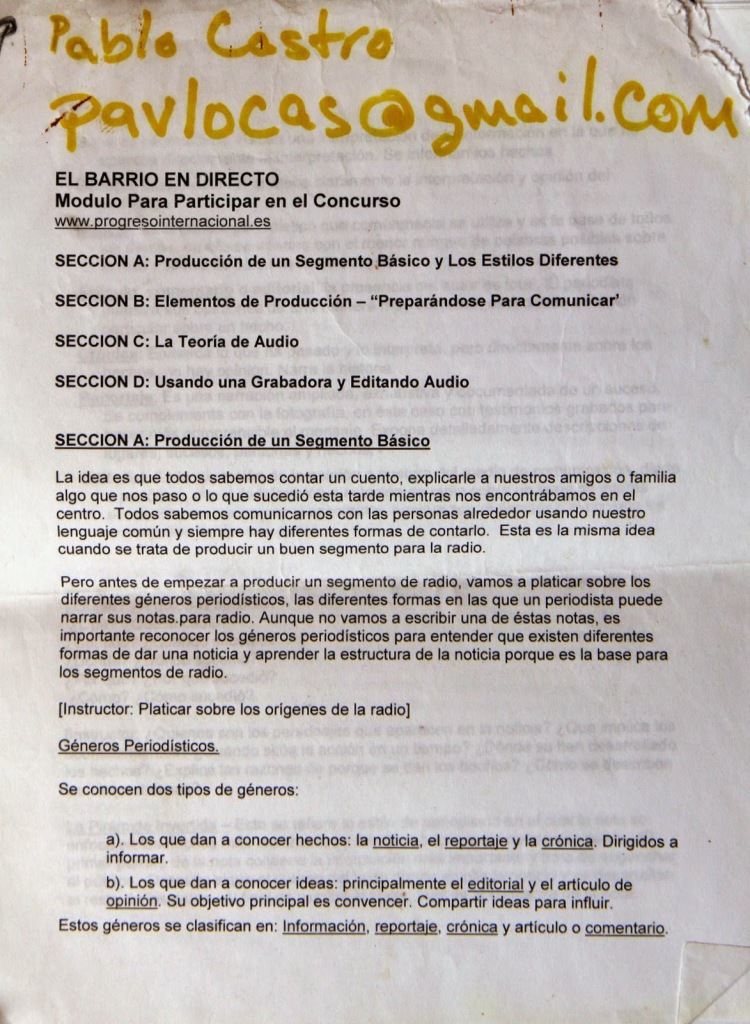
Taxpayer-funded contest aborted
When Jeff Kline visited Cuba offering to train young people to produce radio programs, a 25-year-old Havana woman signed up.
Kline was from another country and another generation, but the woman said the American quickly gained her trust. He was easygoing. He had longish hair and a “hippie appearance,” she said.

Kline told her he was running an international contest for young people. Those producing the best radio programs would receive “netbooks, digital recorders, radio production equipment and other equipment to produce independent programs.”
The woman and other participants produced their radio segments, but the contest was abruptly terminated and no one ever received prizes or explained what went wrong. The woman said:
I feel used. They tried to manipulate me.
The woman didn’t know it at the time, but the U.S. government was behind the contest, called El Barrio en Directo, or The Neighborhood Live. Its organizers left Cuba after American development worker Alan Gross was arrested in December 2009.
Like Gross, Kline was a private contractor.
In May, I wrote that Kline once traveled to Cuba to test cell phones and other wireless devices for a contractor that was working for the State Department. (See “The Other Alan Gross“).
Earlier, in February, I wrote about a Cuba project Kline is doing for the Broadcasting Board of Governors. (See “The incredible disappearing $450,000 contract”).
The woman, now 30, said Kline never mentioned any U.S. government connections. Organizers gave her recording equipment, explained the contest rules and instructionsand she said she didn’t think there was anything else to it.
I was 25 years old. I was very young. Super young.
The woman recalled that Kline talked about one of Cuba’s most famous democracy activists.
He asked me if I knew who Yoani Sanchez was. I told him I didn’t know her.
Kline was incredulous.
He said, ‘You don’t know who Yoani Sanchez is?’
After that conversation, the woman said organizers gave her a book by Sanchez so she could learn more about the Cuban blogger.
Looking back, she believes Kline was “feeling out” participants, trying to discover whether they had “anti-government tendencies.”
 Around that time, Kline, 68, and some of his colleagues also brought into Cuba some $50,000 worth of communications gear, including at least one satellite phone, said another source, who also spoke on condition of anonymity.
Around that time, Kline, 68, and some of his colleagues also brought into Cuba some $50,000 worth of communications gear, including at least one satellite phone, said another source, who also spoke on condition of anonymity.
Cuban authorities confiscated some of the gear and briefly detained one of the employees, identified by two sources as Paul Castro.
The Havana woman said she met Castro, who touted the radio contest as a program for young people in Latin America and the Caribbean.
In reality, Cuba was the program’s only target, said a source who is familiar with Kline’s work on the island and spoke on condition of anonymity.
 A now-defunct website called Progreso Internacional described the theme of the radio contest as “Basic solutions to problems of our community in Latin America and the Caribbean.”
A now-defunct website called Progreso Internacional described the theme of the radio contest as “Basic solutions to problems of our community in Latin America and the Caribbean.”
The site is no longer active, but archived versions contain instructions on the contest and other information.
Still, questions about Kline’s work remain. How much did the radio contest cost U.S. taxpayers? Did it help the pro-democracy cause in Cuba? Was the radio contest a cover for other activities? Was Kline more interested in testing communication gear than training potential dissidents? Or were both tasks important?
Whatever the case, the Havana woman said she feels betrayed. She said she produced a radio program “for nothing” and organizers have never apologized or explained what happened. She said:
I sent them emails. They never responded. What they sell you is a lie.
(From the: Along the Malecon)



